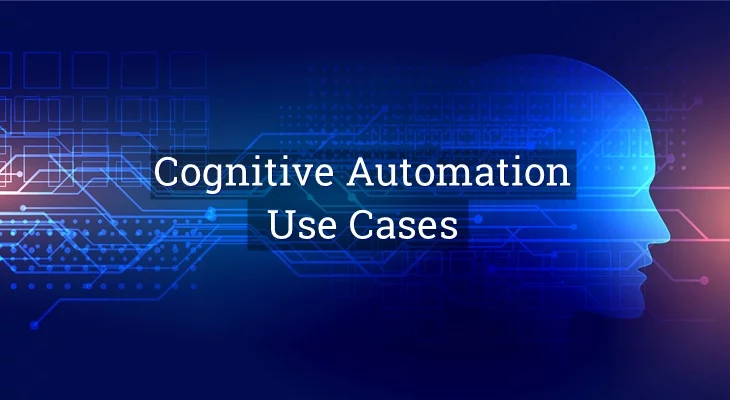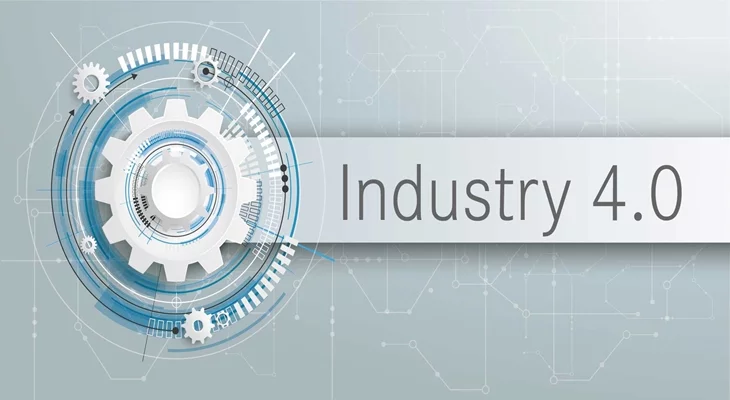Siloed operations and human intervention were being a bottleneck for operations efficiency in an organization. The only solution to this was bringing in automation. Automation helps us handle redundant tasks so that there are no human errors involved, and human intervention is minimal. Cognitive automation brings in an extra layer of Artificial Intelligence (AI) and Machine Learning (ML) to the mix. This provides thinking and decision-making capabilities to the automation solution.
Thus, the AI/ML-powered solution can work within a specific set of guidelines and tackle unique situations and learn from humans.
If a similar issue occurs again, the Cognitive Automation solution can handle it with ease.
Cognitive Automation Use Cases Highlighting its Importance
Cognitive automation is an up-and-coming solution. It has found so many applications across industries.
Want to understand where a cognitive automation solution can fit into your enterprise? Here is a list of some use cases that can help you understand it better.
For a company that has warehouses in multiple geographical locations, managing all of them is a challenging task.
Keeping a track of all the inventory available at all the warehouses, ensuring the maintenance of all the machinery at all times, getting the issue resolved whenever any arises, etc. are some of the tasks associated with managing the warehouses.
This is where cognitive automation comes into the picture. The solution, once deployed helps keep a track of the health of all the machinery and the inventory as well.
It raises an alert whenever it detects any flaw or probability of an error occurring.
For an airplane manufacturing organization like Airbus, these operations are even more critical and need to be addressed in runtime.
Airbus has integrated Splunk’s Cognitive Automation solution within their systems. It helps them track the health of their devices and monitor remote warehouses through Splunk’s dashboards.
One of the significant pain points for any organization is to have employees onboarded quickly and get them up and running.
An organization spends a large amount of time getting the employee ready to start working with the needed infrastructure. ServiceNow’s Cognitive Automation solution has helped Asurion to ease this process.
Once an employee is hired and needs to be onboarded, the Cognitive Automation solution kicks into action.
With ServiceNow, the onboarding process begins even before the first day of work for the new employee. It sends the employee useful information regarding Asurion.
It does all the heavy lifting tasks of getting the employee settled in. These include creating an organization account, setting up the email address, providing the necessary accesses in the system, etc.
Moreover, suppose an employee is leaving the organization. In that case, cognitive automation can remove the accesses provided.
It can also remove email access from the employee to admin access only. Furthermore, it can collate and archive the
data generation by and from the employee for future use.
Also Read: RPA vs. Cognitive Automation: What’s the Difference?
Batch operations are an integral part of the banking and finance sector. One of the significant challenges they face is to ensure timely processing of the batch operations.
Failure to do so has grave consequences attached to it. Cognitive automation solutions can help organizations monitor these batch operations. This ensures they are being processed in time.
Splunk has provided a solution to Freecharge. Here, in case of issues, the solution checks and resolves the problems or sends the issue to a human operator at the earliest so that there are no further delays.
The cognitive automation solution also predicts how much the delay will be and what could be the further consequences from it. This allows the organization to plan and take the necessary actions to avert the situation.
The worst thing for logistics operations units is facing delays in deliveries. This attracts flak from both the end-users and the customers.
The biggest challenge is the parcel sorting system and automated warehouses. They allow a substantial volume of shipping to be conducted daily.
Postnord’s challenges were addressed and alleviated by Digitate’s ignio AIOps Cognitive automation solution. It ensures that their systems are always up and running for smooth operations.
In case of failures in any section, the cognitive automation solution checks and resolves the issue. Else it takes it to the attention of a human immediately for timely resolution.
Today’s modern-day manufacturing involves a lot of automation in its processes to ensure large scale production of goods.
It also helps keep the cost low and meet the demands of the customers.
At Tata Steel, a lot of machinery being involved resulted in issues arising consistently. This was not ideal for the organization. Their entire assembly line could falter due to one issue.
Digitate’s ignio, a cognitive automation solution helps handle the small niggles in the system to ensure that everything keeps working.
It can provide alerts about where the issues are arising from.
If it is a software issue, the cognitive automation solution can handle it on its own. Else, it informs a human to resolve the mechanical issue at the earliest so that downtime can be kept at a minimum.
Customer experience is one of the vital aspects for businesses. This holds especially true in the cut-throat retail sector. Numerous things can go wrong, which can hamper customer experience.
Splunk has helped Bookmyshow with a cognitive automation solution to help them improve their customer interactions.
The solution provides the salespersons with the necessary information from time-to-time based on where the customer is in the buying journey.
This can help the salesperson nudge the customer a bit more into the direction of getting a purchase.
In the retail sector, a cognitive automation solution can ensure all the store systems – physical or online – are working correctly. Thus, the customer does not face any issues with browsing and purchasing the item they like.
In the telecom sector, where the userbase is in millions, manual tasks can be more than overwhelming.
A cognitive automation solution can directly access the customer’s queries based on the customers' inputs and provide a resolution.
Queries can include a new connection, renewal of a connection, change of plans, technical issues, etc.
Splunk provided a solution to TalkTalk and SaskTel wherein the entire backend can be handled by the cognitive Automation solution so that the customer receives a quick solution to their problems.
It has helped TalkTalk improve their network by detecting and reporting any issues in their network. This has helped them improve their uptime and drastically reduce the number of critical incidents.
Conclusion
A cognitive automation solution is a step in the right direction in the world of automation. Organizations are more empowered than before with a solution.
It allows them an edge over the competition by improving their business operations. This helps provide a superior customer experience.
The above-mentioned examples are just some common ways of how enterprises can leverage a cognitive automation solution. It is up to the enterprise now to incorporate it and use it the way it deems fit.
You May Also Like to Read:
What Will Marketing Automation Bring for the B2B Companies?





